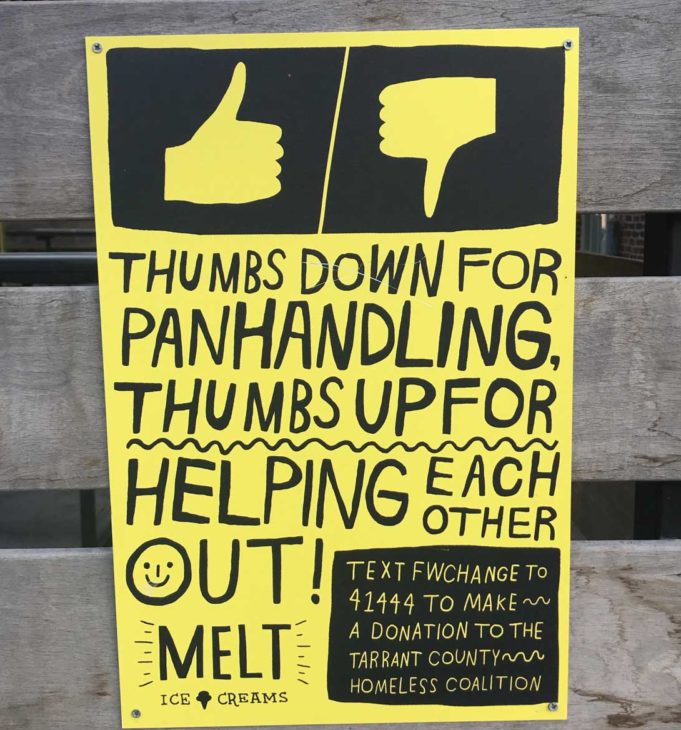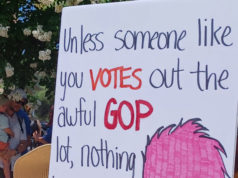On West Magnolia Avenue on the Near Southside, a new sign outside of Melt Ice Creams reads, “Thumbs down for panhandling, thumbs up for helping each other out!” with instructions to text donations to the Tarrant County Homeless Coalition instead of giving cash on the street.
Fairmount has reached peak gentrification. Cute, hipster concepts like Melt aren’t uplifting the neighborhood for the existing community. They are pricing them out. In the process, everyone contributing to displacement has a privilege of distance, enforced by the city, local businesses, and police.
It doesn’t strike the gentrifier that his or her presence represents a violence while purchasing small-batch lavender ice cream. However, the city has an affordable housing crisis, not an adorable ice cream crisis, and despite a wide menu of services, more people experience homelessness year after year. With those services come paternalistic, bureaucratic, and exclusionary requirements from providers.
Fort Worth has more than 6,700 unhomed people, with an estimated 20 percent who refuse services for varied reasons, citing PTSD, mental illness, and having experienced abuse and theft in shelters as examples. Others, like Magnolia musician Russ Emerick, live in their vehicles or on the street, preferring to be unsheltered with their pets than sheltered without them.
Melt is just one business promoting a coordinated campaign of the city, police, and businesses called FWChange to discourage panhandling. The campaign follows City Council’s unanimous vote last year to cite and fine aggressive panhandling. Fort Worth police issued more than 1,000 related citations in 2017 alone. Citations can result in fines, fees for failing to appear in court, and, eventually, warrants and arrest, effectively criminalizing homelessness.
Punishing panhandlers falls under an agenda called broken windows policing that criminalizes visible disorder to support social control. Study after study has found that broken windows policing has no effect on crime.
That doesn’t stop police departments across the country from being empowered by this agenda in budget, technology, and flexibility to interpret the law and define “threat.” In 2014, Eric Garner was killed for selling loose cigarettes under broken windows policing. Garner’s tragic death illustrates the problem with this agenda: Law enforcement officers are afforded an enormous amount of leeway in determining who they believe contributes to disorder and crime in their communities. That’s where biases based on race, class, gender, orientation, and other factors come into play and how the disproportionate power the police have can become life or death over a misdemeanor. Broken windows-inspired laws like “Stop and Frisk” and anti-panhandling ordinances across the country are often eventually overturned on grounds of being unconstitutional and discriminatory.
We may feel a need to differentiate ourselves from the poor. We want to believe we’re fortunate because we worked harder, we were smarter, or we did what we were supposed to do. However, the more I speak with Fort Worth’s homeless population, the more I discover that they are us and we are them.
Home values are up 33 percent, 70 percent of Americans have no savings, and wages are stagnant. Most people are one catastrophe or diagnosis away from disaster, and increasing automation puts everyone on notice for unemployment.
Poverty is not a personal flaw or failing, just a lack of money. Cash can keep someone hydrated, fed, or as a paying customer to use a restroom, cool off, or warm up. Cash carries autonomy — a choice to use funds how one sees fit.
FWChange and the city’s anti-panhandling laws criminalize and dehumanize homelessness and teach us to trust agencies over one another. Melt’s sign may be well-meaning and on-brand, but it supports an ongoing violence against powerless people in favor of those who can fracture neighborhoods with their purchasing power alone.
Investing in neglected neighborhoods can only be praxis if it empowers, builds, or restores for the existing community. Otherwise, it’s just business, and it doesn’t deserve to be called philanthropy.
Lizzie Maldonado is an irreverent writer, community organizer with Democratic Socialists of America Fort Worth, and cofounder of the opioid prevention organization O.D. Aid. @lizonomics













Please support Russ Emerick in this GoFundMe by Joe Savage: https://www.gofundme.com/get-russ-and-his-dog-an-apt
You’re heart is in the right place, but you couldn’t be more wrong, self-righteous, and misguided. Also, Melt sucks. I don’t care to get into here. But feel free to contact me directly and we can discuss, if you like. Keep fighting!
“Citations can result in fines, fees for failing to appear in court, and, eventually, warrants and arrest, effectively criminalizing homelessness.”
Aggressive panhandling, not homelessness, is being criminalized.
1. Unfortunately, the city has produced a number of propaganda posters that say panhandling is illegal, despite the specificity of aggressive panhandling in the ordinance: http://fortworthtexas.gov/FWChange/
2. Fines and fees can amount to warrants and arrest since we still have debtor’s prisons in Texas. There are some people trying to address this issue, but as of now, not having the funds to pay fees and fines can lead to jail time:
https://www.texasmonthly.com/the-daily-post/texas-debtors-prisons-problem/
>”Democratic Socialists of America Fort Worth”
Into the trash it goes.
This lady’s whack and confused
You are RIGHT ON. The culture, community and feel of Fort Worth will be completely choked out by gentrification. Especially in light of the lack of affordable housing. We just had to sell our house because of the hike in property taxes but it had already been surrounded by cookie cutter mansions and boutique apartments. It breaks my heart because all of the people who had lived there for sixty years were given rock bottom for their homes and I know they couldn’t relocate within city limits for that much. Breaks my heart. Also, initially I understood the crackdown on panhandling but any policy that shoulders homeless people with FINES is morally bankrupt.
As a resident of Fairmount, and someone who maintains a healthy skepticism regarding many of our neighborhood’s problems and solutions, I must disagree with you here. The panhandling on Magnolia, specifically, was outrageous until police became more proactive in pursuing and punishing those who did it. Now, I will admit that locking the homeless up in jail for panhandling may be an issue but there needs to be a certain amount of punishing to keep the patrons and residents of the neighborhood safe.
Let’s not forget Fairmount’s past. Should we be embracing an atmosphere of vagrancy, harassment, and crime? Of course not. We can be empathetic and compassionate to those unhomed people who maintain a respect for passers-by and residents while also punishing those who take a step too far. That isn’t a bad policy, as long as it’s enforced fairly and consistently.
And to your larger point, there are valid arguments against gentrification, but you seem to hold a bias and grudge against developers “invading” a neighborhood like Fairmount. In my opinion, gentrification of the Fairmount neighborhood (to the extent you can call it that) is seen as a positive in 95% of residents’ eyes. Re-development and embracing of “hipster business” like MELT has attracted home buyers, home renters, small-business, and new development. The benefits outweigh the risks at almost every turn.
Existing communities (communities pre-gentrification) with high crime rate are in those conditions due to systemic failings in equity (education system, opportunity gap, & no true representation in city council to name a few). When the system is set up to benefit only those who are privileged enough to know how to navigate the flawed system through means of research tools (internet), local elections (tx voter id laws meant to prevent certain people from voting…closing of many dmv locations to further this agenda), and the huge disconnect (segregation, and social class) that still happens, then you get more problems in your neighborhood. I live in Northside and can see how the pre-gentrified Southside was effed over by “new businesses, boutique hotels, and developers who lobby city council or go as far as to get people elected to make power moves such as multi-million dollar investments in “targeted” areas happen, without making an effort to notify vulnerable populations (Spanish speaking, elderly, sick) who own homes. Instead, they prey on these “problematic” populations by low-balling them with cash offers for their homes and sometimes go as far as to threaten them with false documents and information (eminent domain). They know that these people will not have access to check that information, so many people are forced out. Some would have you believe that people just sell their homes to developers. Nope!!! They are pushed out.
As a homeless person myself, I support the efforts to crack down on panhandling in this city. There are too many organizations serving the homeless community especially in the East Lancaster corridor for any homeless to go hungry or even miss a meal. The panhandlers are often sneaky hustlers that will use any ruse to compel sympathy and tug at people’s heartstrings. The Near Southside has worked hard to reinvent itself from a seedy part of town to a livable, walkable community. And we also have the SOMA District coming to life on South Main, so keeping the vagrant and parasitic population (not necessarily homeless) down is important to encourage good foot traffic in those areas. People work hard in order to enjoy a good quality of life; why should they feel guilty about shunning freeloaders? A true homeless person knows where to get resources and should do all right even in their circumstances…I do fine for myself even if I am sometimes clueless about getting housing.